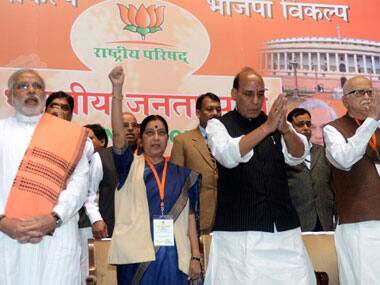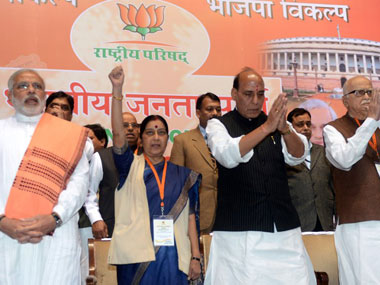Narendra Modi’s relationship with newspaper headlines is similar to the kind of troubled chemistry that Bollywood shares with film critics - they can’t do without each other, but they can’t completely like each other either. Now before Modi’s enraged followers jump in to point out that he doesn’t need the press, one needs to remind them that the Gujarat chief minister’s brand of politicking - that relies greatly on bold, emphatic statement making and metaphor-rich speeches - would miss a lot of its bite hadn’t the mainstream media decided to closely follow and publicize every bit of it. From his Sadbhavna Yatra where the CM demonstrated his skills of wearing many hats (literally) to his open challenge to the PM on independence day, was beamed across television channels and then judiciously post-mortemed in papers the next day. In fact Narendra Modi’s public outreach mechanism rests as much on mainstream media as it does on his vehement social media following. So when the Gujarat PM mentioned during a school function that he wants to serve the people of Gujarat till 2017, no time was lost is trying to decipher the motives behind making such a declaration. The most predictable conclusion would be that it was the Gujarat CM’s thinly veiled threat to the BJP - ’take me, or leave me’. The Indian Express was quick to point this out in its headline: ‘Modi shows impatience’. The Times of India for its part asked the question “Pressure tatic?”, in its headline. With news trickling in that Madhya Pradesh chief minister Shivraj Chouhan has requested the BJP leadership to withhold a declaration that Modi would be PM candidate, and that Sushma Swaraj is holding her own against the mighty RSS’ wishes, it is indeed tempting to read into Modi’s statement as one that exudes disgruntlement and tries to manipulate the BJP to speed up the PM-naming process. However, what Modi’s declaration did - one still doesn’t know if it was a deliberate announcement made to look innocuous as it was being uttered at a school function, or if it was just an impulsive answer to a question he is tired of evading - was that it corrected hints of megalomania that his public image had acquired of late. If one takes a long hard look at his political moves over the past couple of months - it becomes more and more evident that Narendra Modi has gradually grown into a phenomenon bigger than the BJP in the public narrative. While Modi is partially responsible for this, his critics within the party have added to the process of snowballing his political image as one fraught with conflict and hence one that is very differently from the other, more conforming state leaders of the BJP. If Chouhan has indeed expressed fears of being thrown off the spotlight in his own state prior to the elections, it is fairly clear that Narendra Modi has been magnified into a threat of sorts to the political viability of other leaders in his party - something that can’t be too complimentary for the BJP’s morale. [caption id=“attachment_1089855” align=“alignleft” width=“380”]  Narendra Modi with his BJP colleagues. AFP.[/caption] A declaration, like the one Modi made on Teacher’s Day in a Gujarat school, therefore, is well-timed. Whatever the media makes out of it, on his part it looks like an attempt to place the party before him. From Manohar Parrikar to Shivraj Chouhan, all BJP CMs have till now praised Modi and spoken broadly about the UPA’a failures and the BJP’s agenda. Unlike Modi, who is prone to drawing sharp and emphatic parallels between Gujarat and the rest of the country in all his public addresses, the other BJP CMs’ participation in the national political discourse has been mostly diplomatic, even if lacklustre. Modi, however, took flashy controversial strides ahead of his peers and colleagues when he first wrote a long, much-publicized letter addressed directly to the Prime Minister, sounding out his disapproval of the Food Security Bill. Was he not aware of his party’s stand in the Parliament or did he deliberately bypass his party colleagues who vehemently criticized the Bill in the Parliament and yet let it pass? The fact that the Gujarat CM felt the need to register his views separately, even when his party was battling the Bill in the House, can be read by the public and his said colleagues as a not-so-humble move to single himself out as the most effective, if not the sole, voice of concern in the party. It is interesting to note here that throughout the food bill debate, while the BJP leaders brought up the Chhattisgarh food security model several times over and mentioned CMs unhappy with the Bill, not once did they mention Modi directly. Then again Narendra Modi decided to challenge the Prime Minister. While an Independence Day speech by a Chief Minister is neither unusual or flagrant, an independence speech hyped in advance as a ‘challenge’ to the Prime Minister is a rather audacious political statement. One can’t be sure if he had his party’s unanimous endorsement, as LK Advani criticised his move a fair bit. When Modi says he is willing to serve his state till 2017, he puts his agenda and responsibilities towards Gujarat back in the forefront, taking two steps back from pursuing his bigger political ambitions - or at least he gives an impression to that effect. For a third person, observing a party and its tumultuous relationship with one of its most aggressive leader, this looks like a refreshing attempt at reconciliation. And for the prospective voter, Modi’s announcement wipes out doubts about his predilection to run over structures that support leadership heedlessly. For BJP as a party, which had been struggling hard to dodge questions about rifts within it over Modi, it becomes infinitely easy to now play off questions about its unity. Modi has effectively taken a step back to restart the process of putting up a united party front - a move that can reap rich dividends in the run-up to the general elections
Narendra Modi effectively tries to not grow bigger than his party with his latest PM comment.
Advertisement
End of Article


)
)
)
)
)
)
)
)
)



